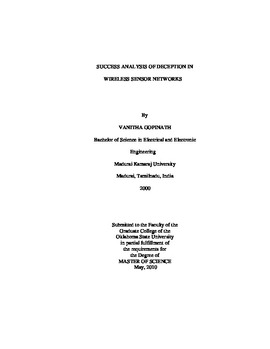| dc.contributor.advisor | Thomas, Johnson | |
| dc.contributor.author | Gopinath, Vanitha | |
| dc.date.accessioned | 2014-04-15T18:31:07Z | |
| dc.date.available | 2014-04-15T18:31:07Z | |
| dc.date.issued | 2010-05-01 | |
| dc.identifier.uri | https://hdl.handle.net/11244/8157 | |
| dc.description.abstract | Wireless Sensor Networks face mutually conflicting purposes, to provide high security to the network while conserving its limited resources. Although much research has been done in this area in the past, the problem of responding to an attack has not received much attention. Deception is one approach to respond to an attack that enables corrective measure to keep the adversary at bay, without alerting the attacker. We focus on measuring how successful this deception process is using Dempster-Shafer theory for combining evidences and handling uncertainty. We identify the parameters concerned for a DoS attack; incorporate uncertainty of the attacker's intention and reliability of the deceiving nodes themselves and attempt to evaluate the deception success depending on the attacker's behavior with time. | |
| dc.format | application/pdf | |
| dc.language | en_US | |
| dc.publisher | Oklahoma State University | |
| dc.rights | Copyright is held by the author who has granted the Oklahoma State University Library the non-exclusive right to share this material in its institutional repository. Contact Digital Library Services at lib-dls@okstate.edu or 405-744-9161 for the permission policy on the use, reproduction or distribution of this material. | |
| dc.title | Success Analysis of Deception in Wireless Sensor Networks | |
| dc.type | text | |
| dc.contributor.committeeMember | Heisterkamp, Douglas | |
| dc.contributor.committeeMember | Chen, Debao | |
| osu.filename | Gopinath_okstate_0664M_10730.pdf | |
| osu.college | Arts and Sciences | |
| osu.accesstype | Open Access | |
| dc.description.department | Computer Science Department | |
| dc.type.genre | Thesis | |
